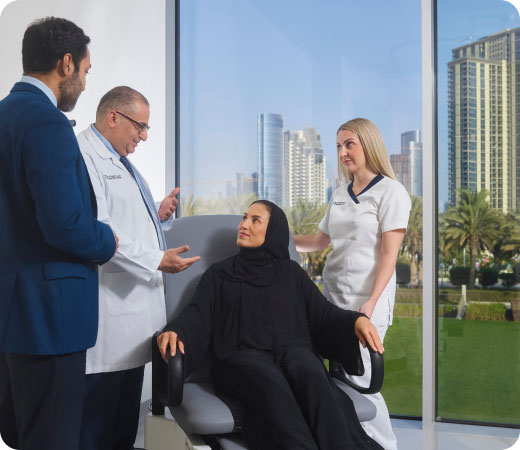
The Prostate Cancer Program provides advanced diagnosis and treatment options for men diagnosed with prostate cancer.
The Prostate Cancer Program at Cleveland Clinic Abu Dhabi provides specialized care and support for men diagnosed with prostate cancer, close to home.
Our multidisciplinary team takes a discreate and compassionate approach to cancer care. Our expert team of surgical, medical and radiation oncologists are experienced in performing the latest, minimally invasive surgical, medical, and non-surgical techniques to ensure patient comfort and the best possible outcome.
Our program offers the very latest and most important technological advances in prostate cancer diagnosis and treatment. We are one of only a handful of centers offering MRI fusion guided biopsy, ensuring a targeted biopsy and more accurate and timely diagnosis. We also offer a range of advanced, minimally invasive options for prostate cancer treatment, ensuring faster recovery, fewer risks, and supporting better outcomes for patients.

Our multidisciplinary team has unique experience in managing prostate cancers, working together to provide every patient with a customized treatment plan. When needed, we draw on the experience of physicians from other institutes, and our global network, working together to diagnose your condition. Additionally, our program meets regularly as a Multidisciplinary Tumor Board to ensure your treatment plan is patient-centered and to the highest standard of care.
Following treatment, our ongoing care ensures that any side effects are managed and minimized, and quality of life is optimized.

Prostate cancer is the most common solid tumor in men globally. The prostate is a muscular, walnut-sized gland that surrounds part of the urethra, the tube that transports urine and sperm out of the body.
Prostate cancer is a cancerous tumor that most often begins in the prostate’s outer area. Usually, the cancer grows very slowly, and many men will never know they had the disease. Early-stage prostate cancer is found within the prostate gland only so most patients with this cancer live for many years without problems.
Prostate cancer is characterized by its stage and grade, which are determined by the size and extent of the tumor. Stages T1 and T2 (early stage), are confided to the prostate gland. Stage T3 has advanced to tissue just outside the gland. Stage T4 (advanced) has spread to other parts of the body.

Prostate cancer has no symptoms in the early stages, signs of disease only appear later. Patients often feel a need to urinate frequently at night, have difficulty urinating, notice a weak or interrupted flow of urine, or have painful and burning urination. Other symptoms may include painful ejaculation, blood in urine or semen, and frequent pain or stiffness in the lower back, hips, or extremities.
The cause of prostate cancer is unknown, but doctors do know that it is more common in African American men and men with a family history of the disease. The male sex hormone testosterone also contributes to its growth.
Prostate cancer is one of the most common cancers in men. The following are some of the risk factors for prostate cancer:

The most effective method to detect prostate cancer is through screening, which involves a digital rectal exam and measuring the amount of prostate-specific antigen (PSA) in the blood.
PSA is a protein secreted by the prostate into the bloodstream. Elevated levels of this antigen may indicate the presence of prostate cancer.
If cancer is suspected, your doctor may request an imaging study, including MRI and PET Scan. Our radiologists have specific expertise in advanced prostate cancer diagnostic and imaging modalities. Additionally, a test called an IsoPSA (a test that an help identify if PSA proteins were made by cancer cells) can sometimes be used to assist our doctors to determine the need for a biopsy.
A prostate biopsy may also be performed. By removing a tissue sample from the tumor and examining it, doctors can confirm or determine if the disease has spread to other organs. Cleveland Clinic Abu Dhabi is one of only a handful of centers in the region to offer MRI fusion guided biopsy for prostate cancer. Combining a specialized MRI scan with images from an ultrasound, doctors can accurately target the area for biopsy, supporting more accurate diagnosis.
Fortunately, most prostate cancers have not spread at the time they are diagnosed, and the cancer is most frequently confined to the prostate gland.
Prostate cancer treatment will depend on the patient’s needs, taking into account the type of cancer, the age of the individual, the degree to which the cancer has spread and the general health of the patient.

Doctors don’t know why many men develop prostate cancer as they get older. While prostate cancer can’t be prevented, if you have any of the risk factors associated with the disease, taking the following steps to improve your lifestyle may minimize your risk:
For men over 40, routine visits to a urologist should be a part of your health routine, to ensure the health of your bladder, prostate, and sexual health, and to help detect early signs of things like prostate cancer.

The Prostate Cancer Program at Cleveland Clinic Abu Dhabi consists of a multidisciplinary team of caregivers, including:

Speak with our Contact Center for assistance
Request an Appointment 800 8 2223 International Patients